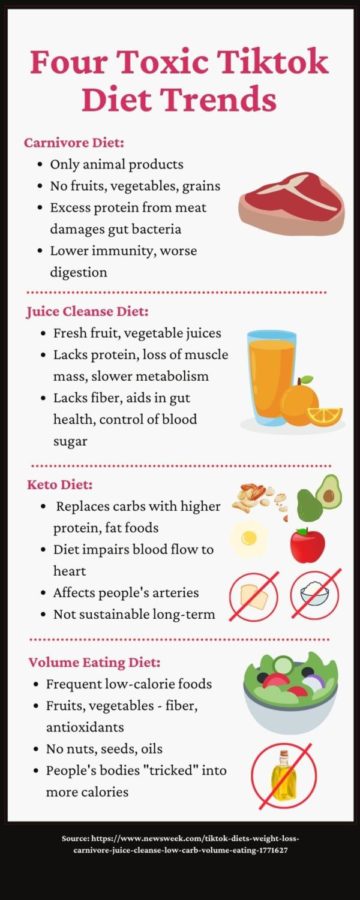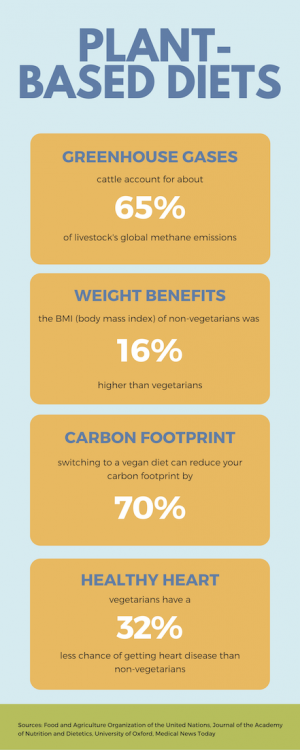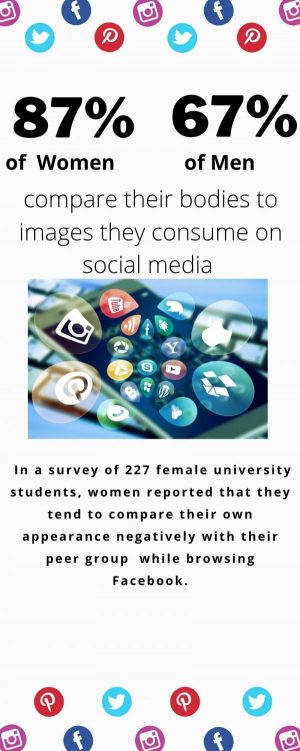Toxic TikTok trends promote harmful stereotypes, lead to negative body image
May 22, 2023

“Eat this. You’ll lose 15 pounds.”
“It’s super easy to lose weight.”
“Don’t eat this, eat the healthy version instead.”
Helpful on the surface, the underlying toxicity of these messages might be lost on a young audience. According to The Social Shepherd, 25% of TikTok users are between the ages of 10 and 19.
This is the turning point for many, an age where teens care too much about what their peers think and too little about their own opinions. It’s an age filled with too much self-consciousness and too little self-esteem. The addition of harmful misinformation on social media skyrockets these habits to an extreme.
According to an article by Marisa Minadeo and Lizzy Pope, researchers at the University of Vermont, diet culture is a set of beliefs centered around weight loss as the ultimate goal and judgment around people that don’t meet the “ideal” body standards; social media platforms, especially TikTok, seem to be where it’s most prominent. In the same study, it was found that weight loss TikToks showcasing food as a means to be thin, therefore healthy, were the most viewed content. Adolescents can easily access all this misinformation multiple times a day, which can result in negative body image and disordered eating.
Of course, unhealthy diet trends are not new; ads and magazines from the beginning of time have featured constant misleading information about weight loss. However, the design of social media, like TikTok, makes it very easy for younger audiences to access short, over-simplified explanations about weight and diets, especially because TikTok’s algorithm filters in more of these videos as people interact with them.
Recent TikTok diet trends include using drugs to lose weight, for example, Ozempic or Wegovy. According to WebMD, Ozempic is a drug used to treat people with type 2 diabetes, however recently, celebrities and TikTokers have been promoting using this drug to lose weight. In addition to triggering a national diabetes drug shortage, advocating for going to an extreme and using a drug to lose weight can be detrimental to people’s body image, not to mention, extreme physical side effects such as pancreatitis, kidney damage and cancer, according to Forbes.
Researchers at the University of Vermont found that the most popular TikTok videos relating to body image and diet illustrated weight loss as the deciding factor between healthy and unhealthy. The study also shows that these videos assign “good” and “bad” labels to food, which, in turn, is associated with “good” and “bad” emotions. This is extremely harmful to teens’ perception of health and their own body as these emotions are internalized and eating ‘bad’ foods brings feelings of shame. The hyper fixation on food can lead to eating disorders as teens become obsessed with eating the “right” foods and consumed with the belief that they will feel better if they lose “just a little bit more.”
TikTok, like all social media, is a vessel for the spreading of misinformation. This same study shows that only 14% of nutrition advice given on the app came from licensed professionals, meaning that most of the information given is not rooted in evidence, but younger audiences will not realize that. They will believe information just because an influencer they follow and like promotes it.
In addition, the nutrition and weight loss information spread is usually spread by influencers with the “ideal” body. Therefore, it is easy, especially for a young, vulnerable audience, to conflate the nutrition information with achieving this “ideal” body. This can result in dissatisfaction and negative thoughts about teens’ own bodies.
To combat these issues, TikTok influencers should choose to steer away from these messages and instead, use their platform to promote healthy and balanced eating. For TikTok users, remember, social media is fake, so don’t fail to look at the facts.




